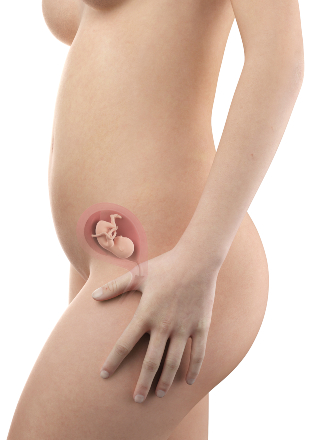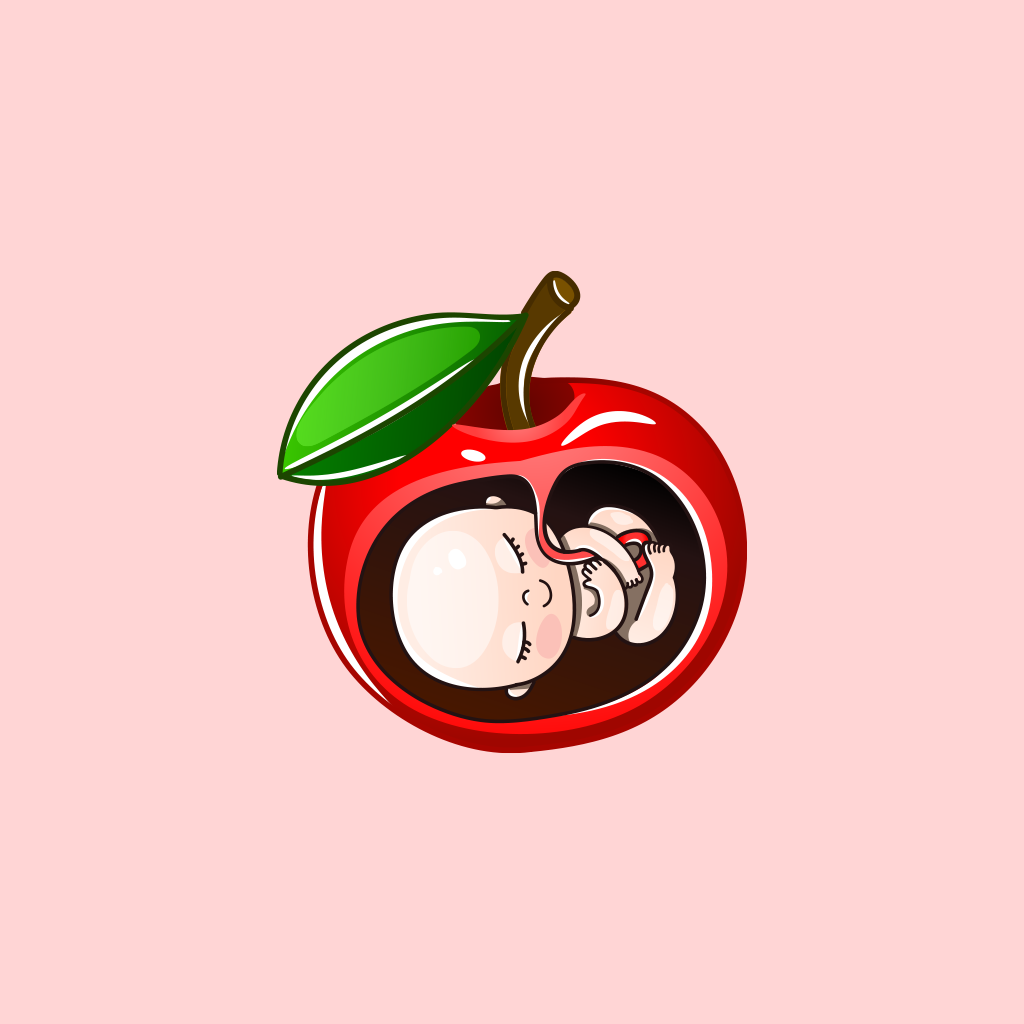Congratulations—you’ve made it to Week 13! This week brings a special milestone: you’re entering your second trimester. Many moms say this is when they start feeling more like themselves again, and for good reason. Early pregnancy symptoms often begin to fade, and you might feel a new sense of energy and wellbeing.
Your baby is growing rapidly and, at about the size of a lemon, becoming more active each day. Tiny fingerprints are forming, and your baby can even start to move their arms and legs. While you likely can’t feel these little movements yet, it’s exciting to know your baby is becoming more wiggly—and unique—every day!

Now’s a great time to notice changes in your own body. You may notice your baby bump slowly becoming more obvious. You might also feel hungrier than before, which is your body’s way of supporting your growing baby. Don’t be afraid to nourish yourself with balanced, healthy meals and snacks.
One common change this week is a lighter mood. You may catch yourself smiling more or simply feeling less tired. Many women find that morning sickness fades away around now, allowing them to enjoy food again and get a bit more rest at night. If you’re still feeling sick or tired, be gentle with yourself. Every pregnancy is different, and these symptoms may take a little longer to ease.
This stage is also a lovely chance to start bonding with your growing baby. Reading stories, playing gentle music, or even talking softly to your belly can be calming for both of you.
Here are a few positive points to focus on as you begin your second trimester:
- Steadier energy levels help you keep up with daily life.
- Your risk of early pregnancy loss decreases significantly after Week 13.
- You’re getting closer to feeling those first magical baby movements.
- Your body is adapting beautifully to support your baby’s next big growth spurt.
This week is all about change—embrace this fresh chapter and trust your body as it cares for both you and your little one. Take time to appreciate how far you’ve come and look forward with excitement to the weeks ahead.
Your Baby’s Development This Week
Welcome to week 13! Your baby has come a long way and this week marks the exciting start of your second trimester. Let’s take a look at some of the amazing changes happening with your little one during this time.
At this stage, your baby is still tiny—about the size of a plum or small peach. But inside, there’s a lot happening that’s helping them grow strong and healthy for the months ahead. You might not be able to feel it yet, but your baby is now wriggling and moving more than ever!
- More Coordinated Movements: Your baby can bend and stretch their arms and legs now, kicking and waving in ways that soon you’ll be able to feel. These first movements are gentle and uncoordinated, almost like a tiny dance happening inside your belly.
- Trying Out Reflexes: Your little one is practicing important skills, like bringing their hands up to their face and perhaps even sucking their thumb. These early movements set the stage for feeding later on.
- Senses Begin to Form: This week, nerve cells in your baby’s brain are multiplying rapidly. These will eventually help your baby sense the world around them. Their eyes and ears, although not fully formed, are moving towards their final positions on their tiny face.
- Internals are Taking Shape: A big milestone this week is that your baby’s intestines, which started developing outside the body, have now moved into the abdomen where they belong. The kidneys are getting to work by producing urine, which is released into the amniotic fluid.
- Tiny Details Add Up: Fingernails have finished forming and now reach the tips of those little fingers. Skin is still see-through and delicate, but will thicken in the weeks ahead. Bones are getting stronger each day as soft cartilage begins transforming into bone, especially in the arms and legs.
- Practice Makes Perfect: You can imagine your baby taking small practice “breaths” by moving amniotic fluid in and out of their lungs, getting ready for that first big breath after birth.
If you could see your baby this week, you’d notice just how much they look like a tiny human now—with a well-shaped head, defined arms and legs, and even little ears sticking out. They’re still growing quickly, which is why your body’s nutrients and health are so important.
Every week brings something new and wonderful. Even though you may not be aware of every change, your baby is busy on the inside, practicing skills and developing tiny features they will soon use to explore and interact with the world. Take a moment to appreciate this exciting stage—your baby is growing stronger and more active each day!
Changes in the Mother’s Body
Reaching the 13th week of pregnancy is a special milestone. As you move into your second trimester, you might start to notice that your body feels a little different – in good ways! Many women find this stage brings more energy, less nausea, and a sense of excitement as their pregnancy becomes a bit more real. Here’s what you can expect as your body continues to adapt and support your growing baby.
- More Visible Bump: Now that your uterus is growing and shifting upward, your lower belly might start to round out. This can be an exciting change, as it’s often around this time that some women begin to show. You may notice that your clothes fit differently too, and it could be time to think about more comfortable or stretchy options.
- Boost in Energy: If you’ve spent the first few months feeling exhausted, you may suddenly find yourself with a bit more pep in your step. This “energy boost” is common as the early pregnancy hormones start to level off. Take advantage of it by enjoying light walks, gentle stretching, or even organizing a few baby basics.
- Changing Digestion: Even as morning sickness often eases, you might notice your digestion is a little sluggish. Constipation and mild bloating are normal, due to hormones that relax your digestive tract. Eating high-fiber foods, drinking enough water, and staying active can really help manage these changes.
- Sensitive Gums and Nose: Your body produces more blood in pregnancy, which sometimes leads to puffy, tender gums or the occasional nosebleed. Gently brushing your teeth and using a soft toothbrush can help, and any persistent dental or nose concerns are worth mentioning at your next checkup.
- Shifting Emotions: As hormones find new balance, you might notice changes in your mood. It’s normal to feel a mix of excitement, anxiety, or even sudden bursts of emotion. Sharing how you’re feeling with your partner, friends, or healthcare provider can help you process these changes with support.
- Breast Changes: Your breasts might still feel sensitive but you may also notice them becoming a little less sore than before. They may continue to grow, and the veins might look more visible as more blood flows through them to support milk production later on.
- Skin Surprises: Some women start to see changes in their skin, like a faint dark line running from the belly button to the pubic area (called the linea nigra) or a healthy pregnancy “glow.” These are common and usually fade after your baby is born.
Remember that every pregnancy is unique, and your symptoms might differ from your friends or family. Most of what you’re experiencing is a sign that your body is working hard to nurture your baby. Always listen to your body and don’t hesitate to ask your doctor about anything that feels unusual. Cherish this time and take good care of yourself—you and your baby both deserve it.
What Medical Checkups or Screenings Do You Need at Week 13?
At week 13, you’re stepping into a new stage of your pregnancy journey! This is the start of the second trimester, and your regular prenatal visits are still very important. These appointments help keep you and your baby healthy, and give you time to talk about any symptoms or worries with your healthcare provider.
- Routine Checkup: Your healthcare provider will usually check your weight and blood pressure, and may listen to your baby’s heartbeat with a Doppler device. Hearing that little heartbeat for the first time can be an emotional milestone!
- Urine Test: A simple urine sample can help spot early signs of problems like urinary tract infections, protein in the urine (which can signal issues later on), or gestational diabetes, even before symptoms start.
- Measuring Your Uterus: Around this time, your provider may begin measuring your belly (fundal height) to see how your baby is growing. This is usually done by feeling your abdomen and using a soft tape measure—no pain involved!
- Screenings for Baby’s Health: If you haven’t already, you might be offered some optional genetic screenings now. These can include blood tests and/or an ultrasound to check on your baby’s development and look for certain conditions. The results help you and your provider make the best decisions moving forward but remember, these tests are your choice.
- Discussing Symptoms & Questions: This is a great time to talk about anything you’re feeling—whether it’s new aches, changes in mood, or questions about what’s normal. No question is too small! Your provider is there to support you.
- Vaccine Talk: If you have not had certain immunizations (like the flu shot), your provider may recommend getting them during pregnancy to help protect both you and your baby.
These checkups are about much more than tests—they’re about making sure you feel informed and prepared. Don’t hesitate to share anything that’s on your mind, whether it’s physical changes or feelings about becoming a mom. Your care team is there to answer questions, offer support, and help you have the healthiest pregnancy possible!
Nutritional Tips and Physical Exercise
As you step into your second trimester, nourishing your body becomes even more important—not just for you, but for your growing baby too! Here are some friendly tips to help you feel your best and support your baby’s healthy development.
- Choose a Rainbow of Foods: Try to fill your plate with a variety of colorful fruits and vegetables. Each color brings different vitamins and minerals that help your baby’s growth and keep your immune system strong. Think leafy greens, berries, oranges, and sweet potatoes.
- Smart Snacking: It’s normal to feel hungrier now. Reach for snacks like yogurt with fruit, a handful of almonds, or whole-grain crackers with hummus. These options give you lasting energy and important nutrients, and help prevent dips in blood sugar that can make you feel tired or cranky.
- Boost Fiber for Comfort: Many women experience constipation as pregnancy hormones slow digestion. Add fiber-rich foods like oatmeal, beans, apples, and pears to help things move along and keep your tummy comfortable.
- Stay Hydrated: Aim for at least 8-10 glasses of water a day. Proper hydration helps your body make enough amniotic fluid and keeps you feeling energized. If water feels boring, try adding a splash of lemon or a few slices of cucumber for a fresh twist.
- Get Enough Protein: Include sources like eggs, lean meats, tofu, beans, or cheese with your meals. Protein is a building block for your baby’s tissues and muscles.
- Include Healthy Fats: Foods like avocado, olive oil, nuts, and seeds offer essential fats that help your baby’s brain and eyes develop. Don’t be afraid to add a little to your salads or snacks.
- Remember Calcium: Your baby’s bones and teeth are forming quickly now. Dairy products (milk, cheese, yogurt), calcium-fortified plant milks, or leafy greens can all help you meet your calcium needs.
Now, let’s talk about keeping your body active!
- Gentle Movement: Walking is a wonderful, low-impact way to stay fit at this stage. Aim for 20–30 minutes most days if you feel up to it. A stroll outdoors can also boost your mood.
- Safe Pregnancy Exercises: Prenatal yoga or swimming are excellent choices. These activities help reduce back pain, improve sleep, and prepare your body for childbirth. They’re also a great way to meet other moms-to-be!
- Pay Attention to Your Body: It’s important to listen to what your body is telling you. If you’re dizzy, exhausted, or in pain, stop and rest. Pregnancy is not the time to push through discomfort.
- Stretch Gently: As your body changes, easy stretching can keep you flexible and help prevent aches. Focus on your back, hips, and legs, but avoid over-stretching.
- Check with Your Provider: Before starting any new exercise routine, especially if you weren’t very active before pregnancy, ask your healthcare provider what’s best for you and your baby.
Every step you take—on your plate and in your routine—helps your little one grow strong and keeps you feeling healthy. Keep listening to your body, and remember: a balanced approach and self-care go a long way!
Weekly Checklist
You’re entering a new chapter in your pregnancy! Week 13 is a great time to focus on your well-being and your baby’s growing needs.
Here’s a helpful checklist to guide you through this exciting stage:
- Celebrate entering your second trimester. Take a moment to acknowledge this milestone—you’ve made it through the first trimester, and many early symptoms are easing.
- Note changes in energy levels. If you’re feeling more energetic, enjoy gentle activities you love, like walking or prenatal yoga, while still listening to your body’s limits.
- Start tracking personal health updates. Jot down any new or changing symptoms, energy shifts, or appetite changes in a small journal to discuss at your next prenatal visit.
- Plan your next prenatal appointment. Make sure you know when your next checkup is and jot down any questions or things you’d like to talk to your doctor about.
- Comfort matters. Consider switching to looser, more comfortable clothing as your body changes. You might find belly bands or maternity leggings helpful for extra support.
- Add a new healthy snack. Try prepping easy, calcium-rich snacks—like Greek yogurt with fruit or a handful of almonds—to support your baby’s bone growth.
- Focus on hydration. Carry a refillable water bottle and set little reminders to drink water throughout the day. Staying well-hydrated helps your growing blood volume and can ease constipation.
- Check medications and supplements. Review all vitamins, supplements, or medicines you’re taking and ensure they’re pregnancy-safe. Bring them to your doctor’s attention if you have any concerns.
- Connect with your support circle. This is a good time to share your news with trusted friends or family if you haven’t already. Emotional support is important as you step into your second trimester.
- Look into prenatal classes. Research local or online prenatal courses to learn more about pregnancy, childbirth, and newborn care. Early registration lets you choose the schedule that works best for you.
- Support your mental wellness. Practice relaxation techniques like gentle breathing, stretching, or meditation to help manage any lingering anxiety or stress.
- Begin gentle belly care. If you’d like, use a mild, unscented lotion to moisturize your belly, hips, and breasts to help with itchiness as your skin begins to stretch.
Every small step helps you and your baby thrive. Remember, it’s okay if you don’t do everything perfectly—what matters is that you take care of yourself and feel supported during this special time. Don’t hesitate to reach out to your healthcare provider with any questions or concerns!
When to Call Your Doctor
Most pregnancies at week 13 go smoothly, but it’s always wise to trust your instincts. While many symptoms are normal, some warning signs need more attention. If you notice any of the following, get in touch with your healthcare provider as soon as you can, just to be safe for both you and your baby.
- Heavy Bleeding: Any bleeding that soaks through a pad or is bright red, especially if it comes with cramping or pain, is a reason to call right away.
- Severe or Ongoing Abdominal Pain: Mild aches and stretching are typical, but sharp or strong pain that doesn’t ease up can be a warning sign.
- Chills or High Fever: If you develop a fever over 100.4°F (38°C), especially with shaking chills or body aches, let your doctor know—this could signal an infection.
- Severe Headaches or Vision Changes: Persistent or intense headaches, blurred vision, or flashes of light shouldn’t be ignored.
- Sudden Swelling: Noticeable, sudden puffiness in your face, hands, or around your eyes can be a concern, especially if it happens quickly.
- Pain or Burning When You Urinate: Discomfort during urination or noticing cloudy, foul-smelling urine could point to an infection that needs prompt attention.
- Leaking Fluid: If you feel a sudden gush or ongoing trickle of clear or pale yellow fluid from your vagina, check with your doctor—this could be amniotic fluid.
- Noticing a Significant Drop in Pregnancy Symptoms: If strong pregnancy symptoms you’ve had suddenly go away, especially if paired with spotting or pain, it’s a good idea to call for advice.
- Persistent Vomiting: Throwing up multiple times a day, especially if you can’t keep even small sips of water down, can lead to dehydration and needs a doctor’s guidance.
- Shortness of Breath or Chest Pain: Any trouble breathing, feeling faint, or chest discomfort are important to mention to your healthcare provider right away.
Remember, if something feels “off”—even if it doesn’t fit the list above—it’s always okay to call your doctor for peace of mind. Your well-being and your baby’s health are what matter most.
Preparations for Baby
As you step into the second trimester, it’s the perfect time to start thinking ahead and making gentle preparations for your baby’s arrival. This can help you feel more confident and connected to the journey ahead. Here are some emotional and home prep tips to consider during week 13:
- Dream together: Set aside time with your partner or a close friend to talk about hopes and wishes for your baby. Sharing your excitement, even if it’s just about baby names or favorite lullabies, can make things feel more real and joyful.
- Start a simple keepsake: Consider keeping a little journal or photo album to track your pregnancy milestones and thoughts. It could be as easy as writing down a special moment from each week.
- Declutter with care: You don’t need to overhaul your whole home right away, but starting to clear out a small space or a few drawers where you plan to keep baby’s things can help you feel organized and ready for what’s next.
- Gather support: Begin thinking about your support system—ask friends or family who have children about what helped them the most. It’s comforting to know who you can lean on for advice or a listening ear.
- Peek at baby gear: No need to buy anything just yet, but browsing baby essentials (like safe sleep spaces, cute outfits, or feeding supplies) can help you figure out what you’ll actually use and like.
- Nurture your bond: Take a moment each day to rest your hands on your belly and imagine your baby growing stronger. Even a few quiet minutes can help you feel more grounded and connected.
- Pamper yourself: Your well-being matters too. Set aside a little time to do something soothing this week—whether it’s reading a favorite book, soaking in a warm (not hot) bath, or listening to calming music.
Every small step you take now is a loving way to prepare for your baby. The goal isn’t perfection—it’s simply creating a warm, welcoming space for your new little one, inside and out.
Citations and References
- American College of Obstetricians and Gynecologists (ACOG) – Details on fetal development milestones and recommended prenatal care at the end of the first and start of the second trimester. Visit Source
- Mayo Clinic – Information on week 13 fetal growth, movement, organ formation, expected maternal symptoms, and lifestyle recommendations. Visit Source
- Cleveland Clinic – Overview of fetal development, maternal changes, and what to expect during prenatal visits around the 13th week. Visit Source
- Centers for Disease Control and Prevention (CDC) – Recommendations for proper prenatal nutrition and guidelines on what foods and substances to avoid during pregnancy. Visit Source
- National Institutes of Health (NIH) – Eunice Kennedy Shriver National Institute of Child Health and Human Development – Guidance on fetal changes, organ development, and maternal health monitoring during the second trimester. Visit Source
- World Health Organization (WHO) – Recommendations for routine antenatal care and essential nutrition for pregnant women at this stage. Visit Source










